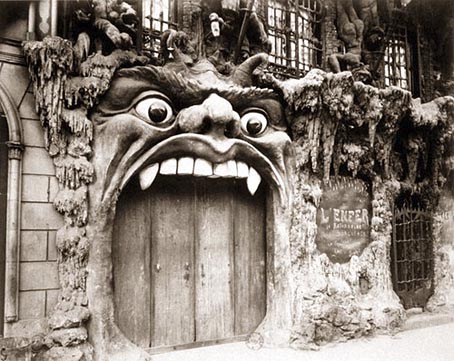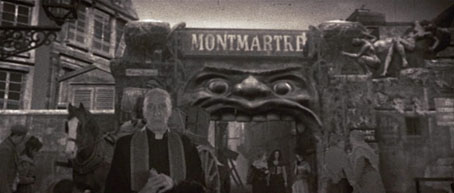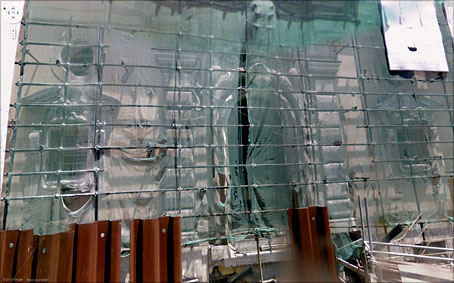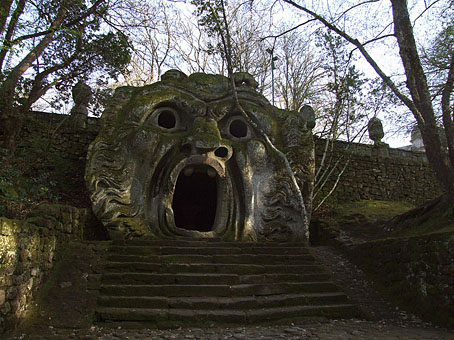
L’Enfer, Boulevard de Clichy (1911).
A recent posting at The Haunted Lamp showed the interior of L’Enfer, a Montmartre cabaret which described itself as “unique au monde”, pictured here in a memorable photo by Eugène Atget. The interior and portions of the exterior were certainly unique enough, and look like they were created by the same people who designed the carnival show for Harry Lachman’s film Dante’s Inferno (1935), but the yawning mouth as an entrance isn’t without precedent. Some prior examples follow.
Palazzo Zuccari.
L’Enfer is long gone, unfortunately, but the entrance to the Palazzo Zuccari in the Via Gregoriana, Rome, is still extant despite being hundreds of years older. I was hoping that Google’s Street View would have some good pictures but they managed to capture the building in the midst of renovation. A friend of mine was working at an office in this street when I was in Rome in 1993 and the yawning mouths and windows are a very curious sight in a narrow road near the Spanish Steps. Flickr has better views, here, here and here.
Ogre, Parco dei Mostri.
The Rome palazzo is named after the Mannerist artist who lived there, Federico Zuccari (c. 1542/1543–1609), and Zuccari’s inspiration for his doorway came from another Mannerist creation, the Parco dei Mostri at Bomarzo. The mouth in this case isn’t an entrance to the underworld but a devouring ogre, and one of the park’s many grotesque attractions. I wonder if this was also an inspiration for the giant floating head in John Boorman’s ludicrous science fiction film, Zardoz (1974).

Moulin Rouge!
And speaking of films, Baz Luhrmann used the L’Enfer entrance as a gateway to Montmartre itself in the zooming shot which opens Moulin Rouge!. I like that idea, as though it’s an iniquitous equivalent of the old Temple Bar gateway to the City of London. For more pictures of L’Enfer, and details of its history, see here and here. If anyone knows of any other notable doorways like these, please leave a comment.
Update: Nathalie found another Bomarzo influence while Jescie on Twitter drew my attention to a set from this German film.
Previously on { feuilleton }
• Villa d’Este
• Harry Lachman’s Inferno
• Atget’s Paris



How about the doorway in the top picture of this page.
http://www.ligotti.net/showthread.php?p=51429#post51429
Apologies for linking to a post of mine on another site, but I’d forgotten where I found the picture originally.
Not as theatrical as the ones posted above, but nevertheless the French sculptor Rodin’s Porte de l’Enfer (the gate to hell) spring to mind. Originally commisioned for the Musée des Arts décoratifs, Rodin worked on the gate for 37 years and it includes several of his better known sculptures like The Thinker and The Kiss. http://en.wikipedia.org/wiki/The_Gates_of_Hell
I’ve never visited this place and only heard about it, but the archeological site of Ek Balam in Mexico should have an acropolis with an entrance shaped like a large mouth. Wikipedia’s article on it, does not provide much detail (http://en.wikipedia.org/wiki/Ek%27_Balam), but teeth can definetly be made in this picture from some travelblog http://www.travelblog.org/Photos/383360
Ludicrous? Zardoz was great!
Wow! Abandon all hope, you who enter…
Wiley: Thanks, I thought there might be a temple or two somewhere exploiting the effect. And I should have remembered Lunar Park in the sandstorm since I posted one of those photos here.
Niels: As with Wiley’s post it seems that Central America favours these things. That’s probably not so surprising for religions that involved human sacrifice. I’m very familiar with the Rodin gate but wouldn’t include that here since it lacks an enormous mouth.
B Smith: I’ve given it a chance on several occasions and I’m afraid the appraisal holds despite some striking images and great photography by Geoffrey Unsworth.
I believe the picture I linked to was taken in Bali, anymore mainly because I said so on the original post, since as of now, I can’t remember where I actually found it. The architecture, especially the eyes and the figure next to the doorway seem Eastern enough. Then again, there are many cultural overlappings between the Far East and over here, our ‘original’ founding fathers.
There have got to be even more examples of this ‘oral doorway’ artform to be found on the Internet. Tradition dictates that the eyes are the windows to the soul. There have always been plenty of eye-like designs on stained-glass windows, and Poe and others have referred to windows as being a building’s eyes and telling of its character.
Yet when someone sneezes, or dies for that matter, the soul, if there is such a thing, allegedly exits via the mouth. It stands to reason then that the world ought to be teeming with oral doorways. Perhaps I’ll go look about.
Neils: I believe I’ve seen the temple you are referring to on some serial documentary about ancient empires. The entrance ‘is’ in the shape of an enormous open mouth, in this case however the mouth is that an giant viper as opposed to something more humanoid. At least this is the case with the temple I saw being investigated, perhaps it was Aztec rather than Mayan.
Just to be a nitpicker it’s actually
http://www.wayfaring.info/2007/03/14/favorite-luna-park-in-sydney-sport-food-and-recreation/
Luna Park
not
http://en.wikipedia.org/wiki/Lunar_Park
Lunar Park
Yeah, I should have checked the spelling. That’s an easier mistake to live with than when I made a post about the dust-storm and said Simon from Ballardian was from Sydney when he’s from Melbourne.
I’ll have to check out Palazzo Zuccari.
Bomarzo inspired a lot of grotesque garden decorations.
This one can be seen in the gardens of the Villa Aldobrandini in Frascati, taking advantage of the local volcanic stones.
If you know anyone who has a copy of Alexander McCall Smith’s Portugest Irregular Verbs tell them to show you the illustration on pg. 133.
http://en.wikipedia.org/wiki/Portuguese_Irregular_Verbs
Just ran across one, unexpectedly:
http://theconstantviewer.blogspot.com/2008/03/june-20-1914-cabiria.html
Yes, I know that one, it’s the entrance to the temple of Moloch where the people feed their children to the flames in order to appease the god in question. That scene is based on one of the chapters from Flaubert’s Salammbô. The whole Moloch concept is another of my pet fascinations and one I may address here at some point.
Aha, seeing that in the context of motion reminds me of the Dragon Tiger Tower in Taiwan, as utilized in this musical scene in Tsai Ming-Liang’s Wayward Cloud.
I look forward to more on Moloch.